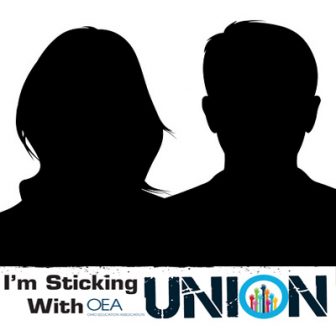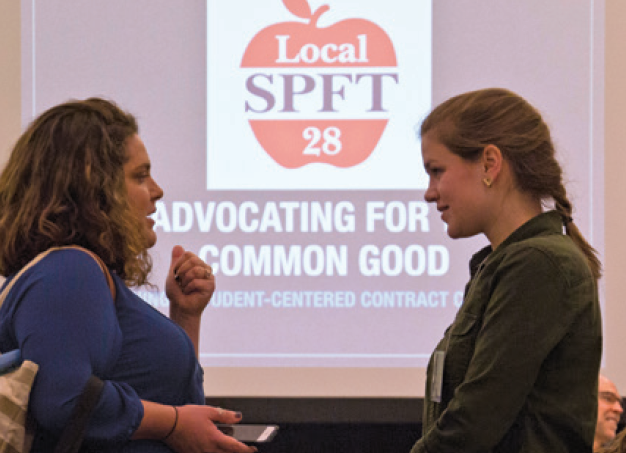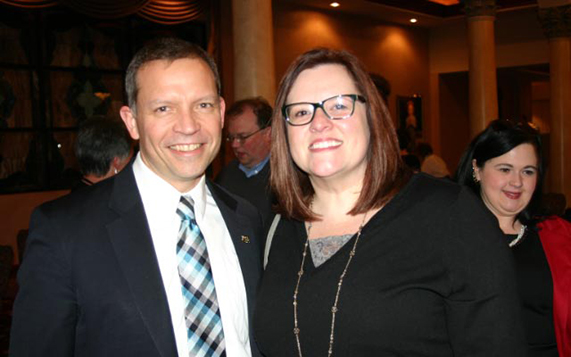Blog: The Antidote to Despair
By Julie Rine is an English Instructor and an Academic Challenge Advisor at Minerva High School, Minerva, Ohio.
 It’s easy to feel hopeless and overwhelmed right now, isn’t it? The Supreme Court’s decision regarding the Janus case, while not unexpected, still stung. The move by the Court has the potential to weaken unions, many sources say, and the decision has even been referred to as a “crippling blow” .
It’s easy to feel hopeless and overwhelmed right now, isn’t it? The Supreme Court’s decision regarding the Janus case, while not unexpected, still stung. The move by the Court has the potential to weaken unions, many sources say, and the decision has even been referred to as a “crippling blow” .
There are certain unfortunate situations in life that we can’t control, and it’s important to recognize those and let them go rather than devote energy to a state of affairs that cannot be changed.
There are also situations in life that we CAN impact, with our actions, our words, our advocacy, but even in those situations, there are moments when you have to let go, politically, personally, emotionally. You have to take a break, look away, check out, turn off the news and turn on a Friends rerun, lose yourself in a good book, take a few deep breaths and decide to let go and let someone else take up the cause for awhile. Those “let go” moments are critical to maintaining good mental health and restoring energy to jump back into the fray when we are refreshed and ready to go.
But this is not one of those times. This is not a “let go” moment. This is a “Let’s Go” moment.
The media would have you believe that the Janus ruling will lead to fewer union members which means a reduction in funds which equals unions cutting jobs and services and benefits. If you believe the news, soon our teacher unions will be so weak and ineffective that teachers will not be able to influence an impressionable kindergartner, let alone legislative policies.
Don’t believe the hype.
If anyone is equipped to turn a bad roll of the dice into an opportunity to change the game, it’s teachers.
On a daily and weekly basis, we think on our feet, we adapt to a snag in the routine. We reflect on what worked and what didn’t and make adjustments in the three minutes between classes, a task that would take Congress three months. We take on whatever challenges exist in our communities and in our classrooms and we overcome them. We don’t stop there, either. Most of the time, we not only overcome the challenges we face, challenges which can change from year to year and week to week, (sometimes even minute to minute!), we create new programs, new methods, and new realities that are often more effective for our students than what existed before the obstacle presented itself.
I don’t care what your political leanings are, if you are a teacher, you rival only parents in your fierce desire to protect kids and prepare them to succeed in the future.
The union helps us do just that. Through the union, we can fight for what our kids need to succeed, such as smaller class sizes, adequate and up-to-date academic resources, onsite counselors and mental health professionals, and a safe environment in which to learn. The union also helps us fight for what teachers need to help students succeed, such as adequate planning time, meaningful professional development, continued opportunities for further education and training, sufficient time to work as teams to tackle problems rather than as isolated instructors behind our classroom doors, and yes, a fair salary which allows us to focus fully on our students and our own families instead of squeezing in hours away from both while we work a second job to make ends meet. The trickle-down effect here is obvious; when teachers lack support and resources, kids lose the effective education they deserve.
So what can we do?
The decision will not be reversed, and even worse, it appears that a new Justice will be seated who may have equally damaging views of unions and public education.
First, we must remember that Supreme Court Justices are not the only ones allowed to issue opinions. We can write letters to the editor of our local papers, and we can routinely call or write our elected officials to make our voices heard and our opinions known.
Secondly, we can actively recruit members, especially young teachers, to not only join the union, but to become active in the union. Retaining or gaining members will of course help the union financially, since our dues dollars provide us with the resources and training necessary to be effective advocates for our students. But we don’t just need the dues money. We need active and energetic members, more than ever before. Money talks, but members act.
Thirdly, we can help register new voters. If we want a future in which citizens are active participants in the democratic process (whether they are on “our side” or not), then we must emphasize the importance and value of our right to vote, and then take the practical step to register young voters. It is a simple process. There is no reason why every 18-year-old student who graduates from an American high school should not be registered to vote.
 We can’t force them to register, however, so the goal should be to get them excited to register.
We can’t force them to register, however, so the goal should be to get them excited to register.
By teaching our students how to read a variety of sources on any given topic and then to form their own opinion, we help them become critical thinkers. Critical thinkers are often eager to make their positions known, and the most powerful way to do that is to exercise the right to vote. Few moments of my teaching career have been as special to me as when I registered a student to vote and she literally high-fived me and yelled, “I can vote, I can vote!” This is the enthusiasm we must seek to engender in our classrooms.
Perhaps most importantly, we can get involved in local and OEA efforts to elect pro-public education and pro-union candidates. We can work phone banks, canvass door-to-door, talk to our colleagues and friends about why we support certain candidates. We must follow that up by voting for candidates who support us as public school teachers and as union members, up and down the ballot, in local elections, in primaries, in midterms and in presidential elections. These actions are particularly important in Ohio this year, as we will be voting for a senator and a governor.
Political defeats can be discouraging, but nothing feels worse than knowing you could have done more to ensure victory when instead you chose to sit on the sidelines. We must take our frustration and allow it to motivate us to take action.
Sure, the Supreme Court decision is a setback, a challenge to be overcome. But a “blow” to unions? I don’t think so. In fact, I think they might have just poked the beast. Joan Baez said “Action is the only antidote to despair.” So don’t despair. Don’t make this a “let go” moment. This is a “LET’S GO!” moment and I have no doubt that we will persevere and succeed. The teachers’ unions are strong because teachers are strong, and we are stronger when we stand together, as friends, as colleagues, and as proud union members.
![]()
— Julie Rine is an English Instructor and an Academic Challenge Advisor at Minerva High School, Minerva, Ohio.
The Power of Participation
By Julie Rine, Minerva Local Education Association
W hen I started teaching 20 years ago, some colleagues taught me some very important tricks of the trade: how to get on the janitor’s good side, how to sweet talk the secretary into making last minute copies for me, how to drink cheap beer (on a young teacher’s salary, that might have been the most important lesson!).
hen I started teaching 20 years ago, some colleagues taught me some very important tricks of the trade: how to get on the janitor’s good side, how to sweet talk the secretary into making last minute copies for me, how to drink cheap beer (on a young teacher’s salary, that might have been the most important lesson!).
And then one of those friends invited me (dragged me) to a negotiations committee meeting. I was a member of the association, but really had no interest in getting involved, primarily because I had absolutely no idea what the union did or how it did it.
I remember he said being on the negotiations committee was a good place to start, because one of the most important jobs of the union was to represent the teachers at the table, to work with the administration of the district to make gains that would better serve the students and teachers of the district.
Looking back, I know that he was trying to get younger teachers involved in the work of the local association, as I do now. It’s important that the ideals and goals of the union pass down from one generation to the next and that we keep getting stronger each time the leadership changes. That colleague is retired now, but I think he would be proud of my involvement with the union that all began with one meeting where we brainstormed the needs we wanted to present to the administration at our contract negotiations that year.
Since then, I have served as Vice President and an at-large representative for our local association (we really need a more flattering title for that position!) and I have represented our association on various committees. I have helped screen local political candidates, attended regional events such as the legal update dinner and the annual meeting with state legislators, and last year I participated in the Representative Assembly in Columbus.
“We might be individuals with different beliefs, experiences, and priorities, but together we form a unit to be reckoned with, one that proudly uses its power and strength to advocate for Ohio’s kids.” — Julie Rine
I’ll admit that the first time I went to the ECOEA Legal Update dinner, it was because it is held at a local restaurant known for good Amish cooking and fantastic pies. I still go back every year, but not just because of the pie; it is truly interesting to hear what court cases and legal issues are affecting teachers in Ohio (and frankly, sometimes quite horrifying!).
This was the first year that I attended the dinner with legislators, but it will not be the last.
To actually have conversations with the men and women who have the power to make decisions that affect education in Ohio is an opportunity that cannot be taken for granted. The State School Board members who joined us that night seemed just as frustrated as we are at the recent actions of several members of the Board.
The legislators answered our questions as best as they could, and it was evident that many of them truly have a heart for education and a desire to stop the madness that public education in Ohio has had to endure under Kasich’s leadership.
Not every question we submitted was presented to the panel that night due to time constraints, but every single submitted question was sent to the panel members afterward. Those men and women now know exactly what issues evoke our anger and our passion, and they will be able to better represent us  because of that three-hour event.
because of that three-hour event.
It was by default that I became our local association’s delegate to the Representative Assembly last year. Each spring, my local asks for people to indicate interest in serving on various committees or being our delegate to the RA. No one wanted to be the delegate. We have a very small budget for the delegates, and it’s actually possible to lose money by going to both fall and spring assemblies. I had no idea what to expect, but I and one other colleague agreed to go.
We held the election in the fall to make it official, but we were the only options. Because I was unable to attend the ECOEA RA prior to the one in Columbus, I did not get the delegate handbook until I arrived, but if I were to do this again, I would definitely get the handbook earlier; it explains what will be voted on, and gives many other details that would have kept me from going in blind.
At the assembly, I saw our union in action. There were the usual organizational tasks, budget reports, etc. (and I’ll confess this English teacher might have zoned out on the numbers, but I’m sure the math teacher delegates were paying attention!). What fascinated me most was the presenting of new business, new concerns and suggestions of issues on which the OEA should take an official position.
One of the issues that came up that year was whether or not there should only be one assembly per year, partly because of the financial strain two meetings can put on small districts like mine. On this issue and others, delegates from all over the state and from every local association could and did approach the microphones to make their opinions known, to make suggestions for language changes, and to offer compromises when the supporters of two opposing viewpoints seemed to be at complete odds with each other. The debates were respectful and orderly; a vote was held and the voices of our members were heard.
One way of getting involved in the union that I have not yet experienced is an annual OEA Lobby Day, and I look forward to participating in that at some point. First, though, I better practice a lot more yoga and deep breathing, because I have a feeling it would be a challenge to keep my temper in check if I ever met some of our current legislators.
If you are not involved in your local or district association, I urge you to consider being more active next year. Join a committee, or attend a yearly regional meeting of some sort (if you’re lucky, one with good pie!).
It might seem like just another meeting after school or just another annual event, but every time an association member is active in any way, our power grows. We might be individuals with different beliefs, experiences, and priorities, but together we form a unit to be reckoned with, one that proudly uses its power and strength to advocate for Ohio’s kids.
Categories
About Voices of ChangeCollective Bargaining
Education Support Professional
General
Higher Education Faculty
Higher Education Staff
Legislative Issues and Political Action
Local Leader
Member Stories
Membership
New Teacher
Non-educator
OEA Member
Organizing
preK-12 Teacher
Retired Member
Student Member
Union Business


